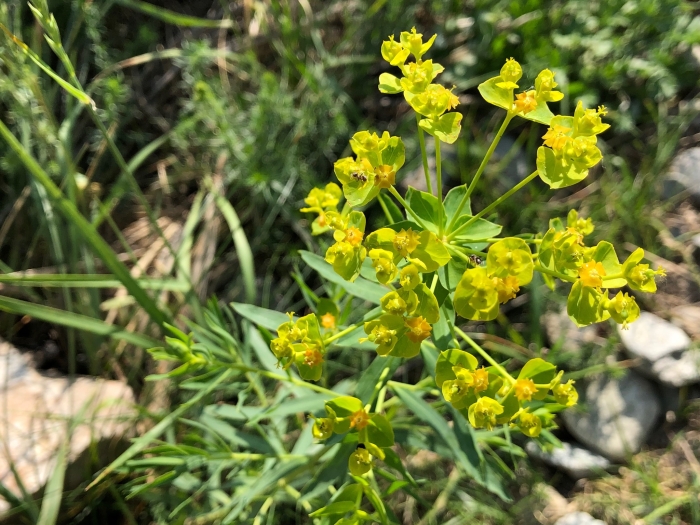Siberian Spurge
(Euphorbia seguieriana)
Siberian Spurge (Euphorbia seguieriana)
/
/

Jason Grant
CC BY 4.0
Image By:
Jason Grant
Recorded By:
Copyright:
CC BY 4.0
Copyright Notice:
Photo by: Jason Grant | License Type: CC BY 4.0 | License URL: http://creativecommons.org/licenses/by/4.0/ | Rights Holder: Jason Grant | Publisher: iNaturalist | Date Created: 2019-06-18T17:33:24-07:00 |















































Estimated Native Range
Summary
Euphorbia seguieriana, commonly known as Siberian Spurge, is a semi-deciduous perennial herb that is native to a variety of habitats including steppes, rocky hillsides, and semi-desert regions across Europe and temperate Asia. It typically grows to a height and width of 1-2 feet (0.3-0.6 meters), forming dense clumps. The plant features narrow, blue-green leaves and bears small, inconspicuous yellow-green flowers surrounded by showy chartreuse bracts that appear in the summer and fall, adding a splash of color to the garden landscape.
Siberian Spurge is valued for its drought tolerance and its ability to thrive in poor, well-drained soils, making it an excellent choice for xeriscaping and rock gardens. It is also used in borders and as a ground cover due to its compact growth habit. This plant prefers full sun but can tolerate part shade and requires minimal maintenance once established. While generally pest-free, it can be susceptible to root rot in overly moist conditions. Gardeners should handle this plant with care, as the sap can cause skin irritation. It is also important to note that Euphorbia seguieriana can be invasive in some regions, so it should be planted with caution outside its native range.CC BY-SA 4.0
Siberian Spurge is valued for its drought tolerance and its ability to thrive in poor, well-drained soils, making it an excellent choice for xeriscaping and rock gardens. It is also used in borders and as a ground cover due to its compact growth habit. This plant prefers full sun but can tolerate part shade and requires minimal maintenance once established. While generally pest-free, it can be susceptible to root rot in overly moist conditions. Gardeners should handle this plant with care, as the sap can cause skin irritation. It is also important to note that Euphorbia seguieriana can be invasive in some regions, so it should be planted with caution outside its native range.CC BY-SA 4.0
Plant Description
- Plant Type: Herb
- Height: 1-2 feet
- Width: 1-2 feet
- Growth Rate: Moderate
- Flower Color: Yellow, Green
- Flowering Season: Summer, Fall
- Leaf Retention: Semi-Deciduous
Growth Requirements
- Sun: Full Sun
- Water: Low, Medium
- Drainage: Medium, Fast
Common Uses
Bee Garden, Bird Garden, Butterfly Garden, Deer Resistant, Drought Tolerant, Low Maintenance, Rabbit Resistant
Natural Habitat
Native to steppes, rocky hillsides, and semi-desert regions across Europe and temperate Asia
Other Names
Common Names: Steppen-Wolfsmilch, Euphorbe De Séguier, Zandwolfsmelk
Scientific Names: , Euphorbia seguieriana, Tithymalus seguierianus, Euphorbia hohenackeri, Euphorbia linearifolia, Galarhoeus seguierianus,
GBIF Accepted Name: Euphorbia seguieriana Neck.